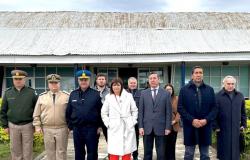He International Monetary Fund (IMF) expects China to reschedule payments for part of the line swap of 18,000 million dollars granted to Argentina. This step is essential to free up cash amid the president’s significant budget cuts Javier Milei and to maintain the IMF’s robust fiscal support program for the country, according to the international agency Bloomberg.
Argentina must pay the People’s Bank of China around USD 2.9 billion this month and another USD 1.9 billion in July, according to data from the Central Bank of the Argentine Republic published last month. A preliminary agreement between Argentine authorities and IMF staff reached in the last review of the country’s program included a firm commitment to refinance or roll over this debt, according to sources familiar with the agreement.
The renewal commitment resolves a significant obstacle to the IMF’s $43 billion program with Argentina, as the government must demonstrate the existence of financing guarantees to manage its large debt. Details of the renewal or refinancing are not yet available. One source suggested Argentina could pay off some of the debt and renew most of it.
The IMF declined to comment, and neither Argentina’s central bank nor China’s embassy in Washington immediately responded to requests for comment.
The IMF executive board will vote on the agreement on Thursday, Economy Minister Luis Caputo said. Subsequently, the IMF will publish the agreement at a technical level.
In April, Caputo mentioned that Argentina is starting talks for a new IMF financing program that could involve fresh funds, and noted that Milei’s monetary and exchange plans are part of the discussion.
The swap with China is the largest source of gross foreign reserves for the Argentine central bank, which currently faces debts greater than its assets. This yuan swap line is the largest in the world.
On Wednesday, June 26, the first installment of the return of the part of the “currency exchange” (swap) with China expires, which was used in 2023, during the management of Sergio Massa as Minister of Economy of the government of Alberto Fernandez.
This is 21,000 million yuan, as the official Chinese currency, the renminbi, is colloquially called, equivalent to USD 2,953 million at the exchange rate of 7.11 renminbi per dollar on Friday, June 7, reported by XinhuaNews. At the end of July another maturity, equivalent to USD 1,969 million, always at the dollar-renminbi exchange rate reported by the Chinese news agency, will bring the total to be paid to the People’s Bank (Central) of China to USD 4,922 million, weeks after that the BCRA’s net reserves entered positive territory, for USD 1,350 million, although – as the analyst specified Salvador Vitelli-, they remain negative at USD 950 million if the 12-month Bopreal is subtracted.
In short, just over 6 months after a maxidevaluation and after a fiscal adjustment that caused the Argentine trade balance (more due to a drop in imports than an increase in exports) to go from a deficit of USD 1,536 million between January and April 2023 to a surplus of USD 6,157 million in the same period of 2024, payments to China would absorb 80% of the commercial dollars obtained in the first four months of the year and would once again leave the BCRA with net reserves in the red for several billion dollars .
The conversations around these two maturities are closely followed by investors in the capital market. The accumulation or not of reserves is seen as a key factor for the stability of the economic plan of the Minister of Economy, Luis Caputo, and for the ability to pay sovereign bonds. In addition to an unavoidable necessity if we aspire to eliminate the exchange rate to allow the economy to move without burdens. Allow it to recover in a short “V” or with any other shape that the eventual advancement of the product may take.
In recent days, rumors that China would force a full payment on each of the maturities were one of the elements that collapsed Argentine assets and took the country risk above 1,500 points. Faced with these fears, described as unfounded by the Government, high-ranking BCRA officials spoke with operators and analysts to calm down: there will be refinancing, is the message they sent. However, there are no details of what the rescheduling scheme would be. The most mentioned is a one-time payment of USD 2.4 billion and a new schedule for the rest of the debt. A rather onerous solution for the fragile situation of international reserves.






